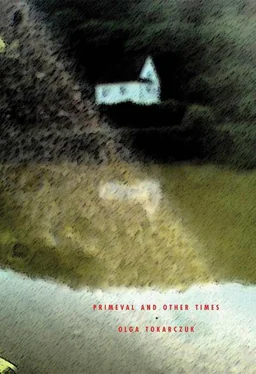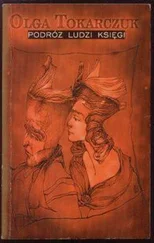Before the holidays Misia told her father she would no longer be going to college in Taszów and that she had no head for calculations and calligraphy. She was still friendly with Rachela Szenbert, but their conversations were different now. They walked along the Highway to the forest together. Rachela urged Misia not to drop school. She promised to help her with arithmetic. And Misia told Rachela about Paweł Boski. Rachela listened, as a friend would, but she was of a different opinion.
“I’m going to marry a doctor or someone like that. I won’t have more than two children so I won’t ruin my figure.”
“I’m only going to have a daughter.”
“Misia, do stay on until graduation.”
“I want to get married.”
Along the same road Misia went for walks with Paweł. By the forest they held hands. Paweł’s hand was big and hot. Misia’s was small and cold. They turned off the Highway down one of the forest roads, and then Paweł stopped, and with that big, strong hand he drew Misia close to him.
He smelled of soap and sunlight. At this point Misia became rather weak, submissive and limp. The man in the white starched shirt seemed enormous. She barely reached up to his chest. She stopped thinking. It was dangerous. She came to her senses once her breasts were already bare and Paweł’s lips were roaming across her belly.
“No,” she said.
“You have to marry me.”
“I know.”
“I’m going to ask for your hand.”
“Good.”
“When?”
“Soon.”
“Will he agree? Will your father agree?”
“There’s nothing to agree. I want to marry you and that’s all.”
“But…”
“I love you.”
Misia tidied her hair and they went back to the Highway, as if they had never left it.
Michał did not like Paweł. He may have been good looking, but that was all. Whenever Michał looked at his broad shoulders, strong legs in breeches, and shining boots, he felt painfully old and shrunken like a dried-up apple.
Paweł came to their house very often now. He would sit at the table and fold one leg over the other. With her tail tucked under, the bitch Dolly would sniff his polished boots and their tops made of dog skin. He talked about the business he was doing with Kozienicki in the timber trade, about the school for paramedics where he had enrolled, and about his great plans for the future. He looked at Genowefa and smiled the whole time, giving a close, thorough view of his even white teeth. Genowefa was delighted. Paweł brought her small gifts. With a blush on her face she would put the flowers in a vase, as the cellophane rustled on a box of chocolates.
“How naive women are,” thought Michał.
He got the impression that his Misia had been written into Paweł Boski’s ambitious life plans, like an object. With complete calculation: because she was the only daughter, virtually an only child, because Izydor didn’t really count. Because she was going to have a fine dowry, because she was from a wealthier family, because she was so different, elegant, beautifully dressed, delicate.
As if by the way, Michał sometimes spoke in his wife’s and daughter’s presence of old Boski, who had said maybe a hundred or two hundred words in his life and spent all his time on the manor house roof, and of Paweł’s sisters, who were plain and mediocre.
“Old Boski is a decent fellow,” Genowefa would say.
“So what, no one’s responsible for his siblings,” added Misia, looking meaningfully at Izydor. “There’s someone like that in every family.”
Michał would pretend to be reading the newspaper as his daughter dressed up to go dancing with Paweł on Sunday afternoons. She would spend about an hour preening before the mirror. He saw her fill in her eyebrows with her mother’s dark pencil and carefully paint her lips in a furtive way. He saw her standing sideways before the mirror to check the effect of her brassiere, and putting a drop of violet scent behind her ear, her first perfume that she had begged for as a seventeenth birthday present. He said nothing as Genowefa and Izydor looked out of the window after her.
“Paweł has mentioned marriage to me. He said he’d like to propose now,” said Genowefa one such Sunday.
Michał refused even to hear her out.
“No. She’s still too young. Let’s send her to Kielce, to a better school than the one in Taszów.”
“She doesn’t want to study at all. She wants to get married. Can’t you see that?”
Michał shook his head.
“No, no, no. It’s still too soon. What does she want a husband and children for? She should enjoy life… Where are they going to live? Where’s Paweł going to work? He’s still at school too, isn’t he? No, they’ve got to wait.”
“Wait for what? Until they have to get married in a hurry, urgently?”
That was when Michał thought of the house, that he would build his daughter a big, comfortable house on good land. That he would plant an orchard for it and provide it with cellars and a garden. A big house, so Misia would not have to leave, so they could all live there together. There would be enough rooms in it for everyone, and their windows would look out in all four directions. And it would be a house with foundations made of sandstone and walls made of real brick, which would be kept warm from the outside by the best timber. And it would have a ground floor, a first floor, a loft and cellars, a glazed porch, and a balcony for Misia, so she could watch the procession coming across the fields at Corpus Christi from it. In this house Misia would be able to have lots of children. There would also be a servant’s room, because Misia should have domestic help.
Next day he ate his dinner early and went all round Primeval looking for a site for the house. He thought of the Hill. He thought about the common by the White River. All the way he calculated that building such a house would take at least three years, and would delay Misia’s marriage by that time.
On Easter Saturday Florentynka went off to church with one of her dogs for the blessing of the food. Into her basket she put a jar of the milk that fed her and her dogs, because that was all she had in the house. She covered the jar in fresh horseradish leaves and periwinkles.
In Jeszkotle baskets full of the food to be blessed for the Easter Sunday meal are placed on the side altar of the Virgin Mary of Jeszkotle. It is the woman who should take care of the food – both its preparation and its blessing. God-the-man has more important matters in his head: wars, catastrophes, conquests, and distant journeys… Women take care of the food.
So people brought their baskets to the side altar of the Virgin Mary of Jeszkotle and waited on benches for the priest to come and sprinkle holy water. Each person sat at a distance from the next and in silence, because on Easter Saturday the church is dark and hushed like a cave, like a concrete air-raid shelter.
Florentynka went up to the side altar with her dog, whose name was Billygoat. She put her basket down among the other baskets. In the others there was sausage, cake, horseradish with cream, colourful painted eggs, and beautiful white bread. Ah, how hungry Florentynka was, and how hungry her dog was.
Florentynka gazed at the picture of the Virgin Mary of Jeszkotle and saw a smile on her smooth face. Billygoat sniffed at someone’s basket and pulled a piece of sausage out of it.
“Here you hang and smile, good Lady, while the dogs eat your gifts,” said Florentynka in a hushed tone. “Sometimes it’s hard for a person to understand a dog. You, good Lady, surely understand animals and people equally. Surely you even know the thoughts of the moon…”
Читать дальше












